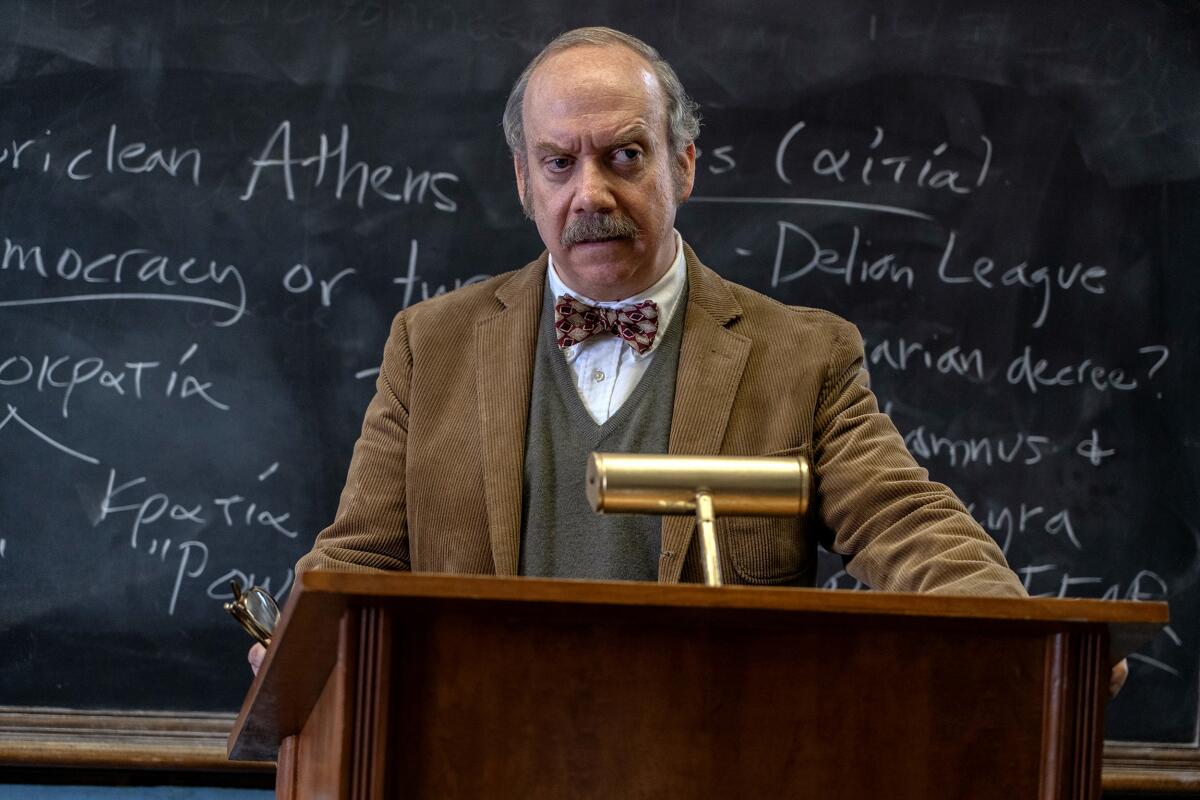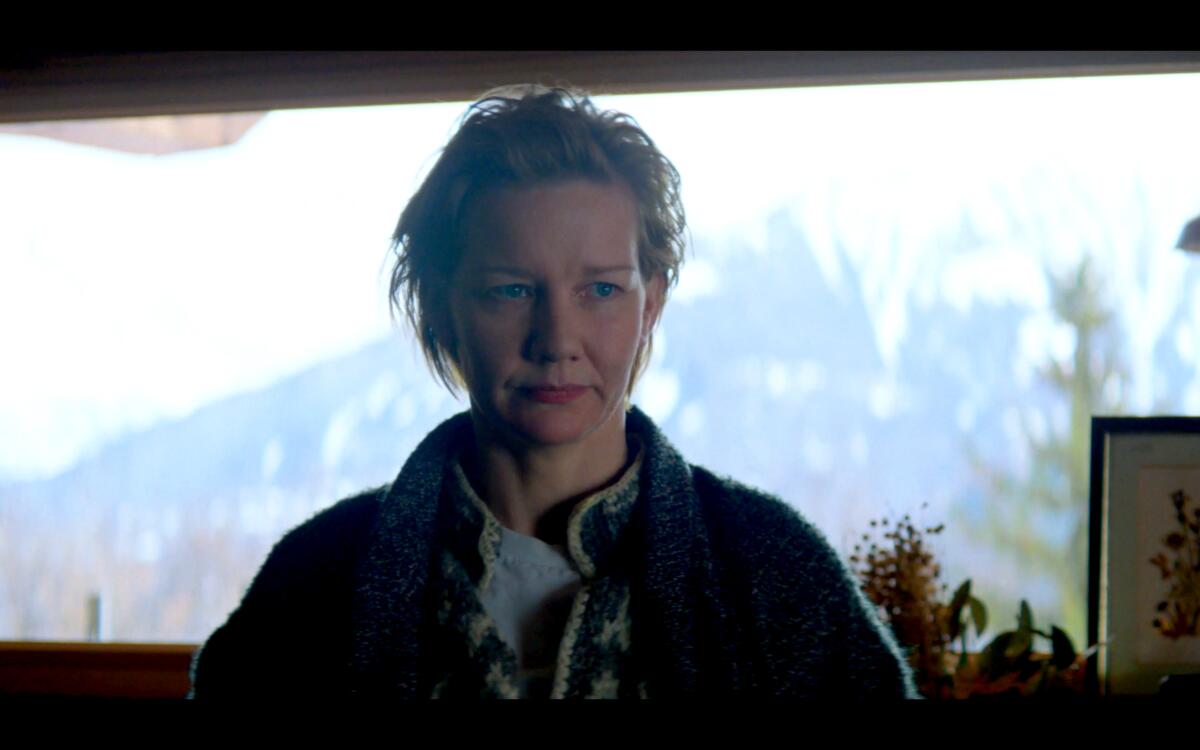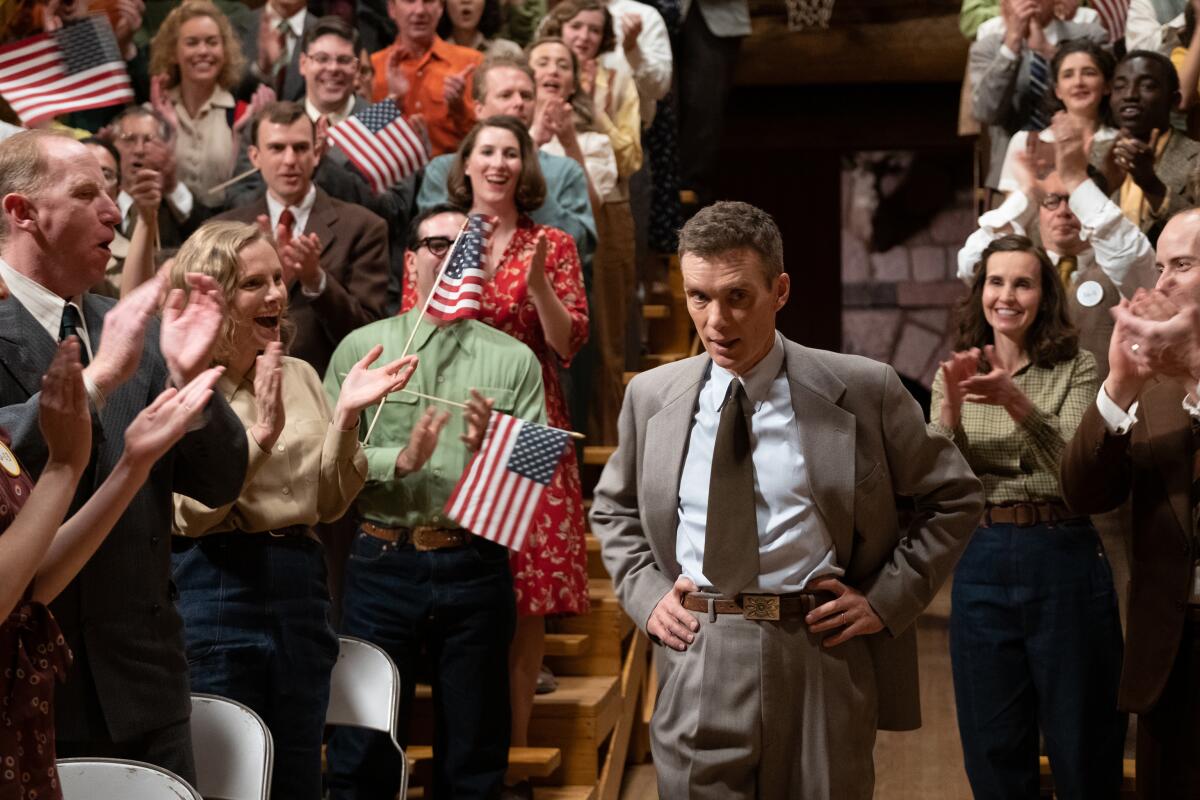The Oscars are still more than a month away, meaning there’s plenty of time for awards campaigners to sabotage the best-laid plans of their rivals and go through the ordeal of trying to find the perfect Valentine’s Day gift for their partner or perhaps, in lieu of that, simply throw themselves out of a second-floor window, à la “Anatomy of a Fall,” so they don’t have to A) shop for scented candles and B) endure one more awards season Q&A.
Most of the 23 Oscar categories are pretty much over and done. For some, thank-you speeches should be in the fine-tuning stages. For others, demonstrations of gracious defeat should be honed. (Paloma Diamond, I’m sure, would have some useful advice.)
But there are a handful of categories still up for grabs, which is good news for awards consultants trying to justify their retainers and columnists hard-pressed to find something — anything — to write about between now and the March 10 ceremony. (Why are the Oscars in March again? Asking for a friend.)
Emma Stone is in a tight race for the lead actress Oscar, mostly with Lily Gladstone of “Killers of the Flower Moon.”
(Atsushi Nishijima/Searchlight Pictures)
LEAD ACTRESS
Leading contenders: Emma Stone (“Poor Things”) and Lily Gladstone (“Killers of the Flower Moon”)
Stone’s fun, ferocious, go-for-broke turn as Bella Baxter in “Poor Things,” where she moves from ungainly adult toddler to feminist philosopher, is the kind of performance that seems undeniable when you see it. Kind of like Cate Blachett last year in “Tár,” and we all know how that turned out. But “Tár” was a chilly movie, while “Poor Things” might be the first film Yorgos Lanthimos has made in which you don’t get the feeling that he hates nearly everyone in it. Quite the contrary: His love for Bella — and, by extension, the woman playing her — is evident in nearly every frame. Also: Stone is in nearly every frame.
That’s not the case with Gladstone, who is in less than a third of the 3½-hour “Flower Moon.” One academy member told me he voted for her in supporting, not lead. “I wish she’d campaigned there,” he says. “Due respect to Da’Vine Joy Randolph, but she would have won going away.” Gladstone’s work is just as persuasive as Stone’s — only she conveys it through silences and sheer presence. That’s distinctive. She’d make history as the first Native American to win the lead actress Oscar, but voters don’t seem completely sold on the movie. (The screenplay and co-star Leonardo DiCaprio were not nominated.) In fact, it’s starting to feel like it might be blanked on Oscar night, just like Martin Scorsese’s last film, “The Irishman.”
It happens to the best of them, including, yes, “Tár.” History will be kinder.
Ahead at the moment: Stone

Our columnist gives Paul Giamatti of “The Holdovers” the edge for the Oscar over Cillian Murphy’s work in “Oppenheimer.”
(Seacia Pavao/Seacia Pavao)
LEAD ACTOR
Leading contenders: Paul Giamatti (“The Holdovers”) and Cillian Murphy (“Oppenheimer”)
Oscars are given for the work, sure, but mostly the wins happen for the narratives created about the work. Matthew McConaughey won for the McConaissance. (Do you even remember the name of the movie?) Al Pacino (“Hoooo-aaah”) and Paul Newman prevailed because they had been ignored for classic movies that should have won them the Oscar. They weren’t just due. They were overdue. Last year, Brendan Fraser won because … well, I still don’t get that, but then I wasn’t the right age when “George of the Jungle” came out.
This year, Giamatti might win because after the Golden Globes, on a whim, he stopped for a burger at the In-N-Out in Westwood. This act of satisfying a blinding hunger caused by having to pick through another insubstantial awards season dinner symbolized Giamatti’s self-aware, self-effacing journey the last few months, winning prizes, never giving the same speech, striking an impressive balance between humility, heartfelt appreciation and humor. He’s old enough to know that opportunities like this don’t come around often.
Murphy, meanwhile, is a lovely human being, and you can stare into his piercing blue eyes and listen to his Irish lilt all the livelong day, even though he’d prefer to remain quiet and a bit mysterious and let Robert Downey Jr. do all the talking. Murphy plays the title character in the film that will win the Academy Award for best picture, feverishly inhabiting the skin of a man at war with himself. Big movie, quiet intensity, three-hour running time. Points that can’t be ignored — unless it’s the Oscars.
Ahead at the moment: Giamatti

Will “Anatomy of a Fall,” starring Sandra Huller, take the original screenplay prize even against “The Holdovers” and “Past Lives.”
(Le Pacte)
ORIGINAL SCREENPLAY
Leading contenders: “Anatomy of a Fall,” “The Holdovers,” “Past Lives”
Admittedly, I’m probably widening this to include “Past Lives,” Celine Song’s beautiful, nuanced debut feature, a marvel for the (yes) original way it depicted its complicated, heartbreaking romantic triangle. It’s the class of the nominees, but aside from best picture, this is its only other nod. It’s a long shot.
“The Holdovers,” as we all know, has its fans among the “they don’t make ‘em like they used to” crowd, enough to earn it five nominations. Its warm melancholy and holiday setting make it the cinematic companion piece to Vince Guaraldi’s soundtrack to “A Charlie Brown Christmas,” imbued with loneliness and yet somehow full of hope. It’s downright cozy, a word you’d never associate with twisty, cerebral and sometimes sinister “Anatomy of a Fall,” another film that scored five nominations. It’s ambiguous. It’s French. And it’s co-written by Justine Triet, also nominated for director.
Ahead at the moment: “Anatomy of a Fall”

“Oppenheimer” is likely to take the adapted screenplay Oscar.
(Melinda Sue Gordon/Universal Pictures)
ADAPTED SCREENPLAY
Leading contenders: “American Fiction,” “Barbie,” “Oppenheimer”
“American Fiction” has its advocates, though it feels a bit overstuffed. This is probably more of a “Barbenheimer” slugfest with a layer of added intrigue, thanks to Greta Gerwig’s omission in the director category. “Do they want to give Greta the Oscar?” one consultant asks. “That’s the narrative here.” Several voters expressed dismay that the academy moved it from original screenplay, where it had been submitted. “I’m voting for it,” one academy member told me, “but I have friends who won’t because it’s about a plastic doll.” Another sniffs: “It made a lot of money. It already won. She can stop reminding us how smart she is.”
Ahead at the moment: “Oppenheimer”

“Spider-Man: Across the Spider-Verse” could be battling “The Boy and the Heron” for the animated feature trophy.
(Sony Pictures Animation/Sony Pictures Animation)
ANIMATED FEATURE
Leading contenders: “The Boy and the Heron,” “Spider-Man: Across the Spider-Verse”
Academy members notoriously don’t watch all the nominated films in this category. (Same with documentary and the shorts.) If they have kids, they saw (or at least noticed it playing in the background) “Spider-Verse,” probably more than once. It’s part one of an “epic,” and a couple of voters told me they’d be fine waiting to reward the next movie, but not this one. “Particularly when there’s a Miyazaki movie on the list,” said one. “How many more movies is he going to make?” Well, Hayao Miyazaki has announced his retirement before, but “The Boy and the Heron” does feel like something of a farewell. Common sense says to go with the most-watched movie, but sentiment could very well prevail.
Ahead at the moment: “Spider-Man: Across the Spider-Verse”

